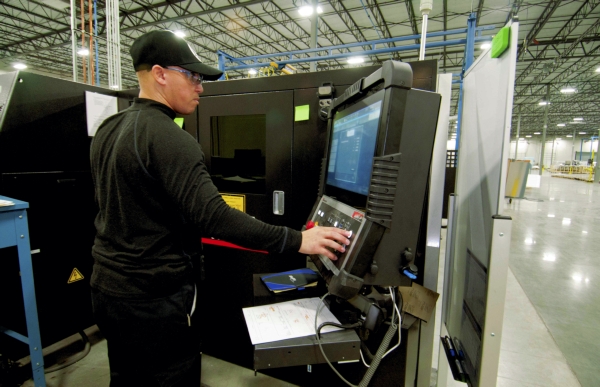Spirit of Rowan: The 21st century manufacturer
Published 12:05 pm Tuesday, March 29, 2016

- JON C. LAKEY / SALISBURY POST The use of computers and technology allow employees like Jason Sales to operate equipment. Agility Fuel Systems opened a manufacturing facilty to build Compressed Natural Gas fuel cells for tractor trailer engines. The company makes cells that fit behind the tractor cab in an upright position and those that can fit on the side like standard "saddle bag" configurations.
By Amanda Raymond
amanda.raymond@salisburypost.com
It’s easy to feel small when you walk onto the production floor of a manufacturing company. There are high ceilings and open spaces, tall piles of material in different corners waiting to be picked up and manipulated into different shapes and sizes. The high-pitched sound of drills and the hum of machines serve as background music, and the goggled, uniformed workers know every step to the dance.
There used to more steps to the dance. Employees were expected to create and build the products by hand, trying their best to create as many of the same product in the exact same way every time. But they were only human after all, and no matter how precise they tried to be, there was bound to be some variation from part to part. And they could only build so many parts in a day.
Things are different today; machines and computers have taken over many of the jobs human beings used to be expected to do. The way employees are trained is different. Automation has allowed manufacturing to produce quality products faster, more efficiently and cheaper, which is great for employers because it saves them money. But as with almost everything else in the world, there are some negative aspects to having technology in the manufacturing business. Employers just have to trust that the good outweighs the bad.
Quality inspectors
Stan Honeycutt, a certified production technician professor at the N.C. Manufacturing Institute, said when it comes to the changes that have occurred in the manufacturing industry, the short answer is automation.
Instead of manufacturing employers relying on people to create products by hand, they now rely on employees to be able to input a program into a computer or machine to manipulate materials the right way.
Honeycutt said many manufacturing employees just need to know how to set up the machines and what the product is supposed to look like in the end.
“You really become more like a quality inspector and machine operator,” he said.
Although the assembly process still requires human labor, manipulating and preparing the raw material is highly automated in the manufacturing business today.
“We have operators loading parts into fixtures, equipment for laser machines to laser cut and brake presses to shape and form the parts,” Shawn Adelsberger, director of operations at Agility Fuel Systems, a natural gas fuel system manufacturer, said.
Out on the production floor, you can actually look through a window into a machine and see the lasers cutting holes into the metal parts.
There are computers at different stations with employees working with specific programs to make the machines bend, cut and notch the materials in specific ways.
There are also machines that can check if the product was created correctly, like the roamers, a portable measuring device, that employees at Agility Fuel Systems use. The operators could still check the measurements of the holes and the angles of the bends manually, but the roamer can do it quicker and more efficiently.
Over at Imperial Brown, a walk-in cooler and freezer manufacturing company, there are presses to cut rails into the perfect lengths and Euromac machines that punch different patterns of holes into the material. The machines even stick a label on the materials so that the employees know exactly what to do with it.
On top of new machinery, there are also gadgets to help with other day-to-day things, like inventory counts. Honeycutt said employees can now keep track of the amount of material they are using, and when it gets down to a certain level, the computer can, in most cases, automatically order more product. That means companies don’t have to worry about wasting money by ordering too much material. And it also means employers don’t have to hire another employee to specifically handle inventory.
So, according to Honeycutt, technology saves companies money in two big ways — replacing what people used to get paid for with faster, more accurate machines cuts down on labor costs and having machines that can do it right the first time, every time, cuts down on waste and reduces raw material costs.
Justin Sandall, president of Imperial Brown, said the best thing about technology is the ability to avoid human error and other personal issues people may have.
“The biggest pro to technology is computers don’t make mistakes,” he said. “They don’t make mistakes, they don’t call in sick, they don’t have all of the personal issues that employees are plagued with.”
Adelsberger said companies can give their customers high-quality products that can only get better as technology advances, like trucks that have the ability to run on natural gas or smart freezers that can change the clarity of its glass door from crystal clear to opaque at the touch of a button.
The people behind the machines
A drawback of having technology that is always advancing is the constant need to train employees to use it, Adelsberger said.
“When you’ve been around one product for a certain time frame and now you have a design change or a new product coming down the line, you have to have flexible equipment, you have to have flexible people to adapt to that,” he said.
For Sandall, the way employees are trained can sometimes be a negative thing. Today’s workforce doesn’t need to know as much as they used to have to know to do their job, which can be challenging for products that need to be very customized. He said it can be difficult to take the knowledge that the more experienced employees have and give it to the new employees while giving “them a reason to care about it and feel a need to know that information.”
The educational requirements for today’s manufacturing employee have definitely changed. Now instead of being specially trained on certain manufacturing processes, students are trained to be able to go into any manufacturing field, whether that is working for a company that produces coolers or one that produces fuel systems.
Honeycutt said machine operators need to have general computer skills, and the more mathematically minded he or she is, the better he or she will do. The N.C. Manufacturing Institute tries to create the employees that manufacturing employers want — employees who are reliable, punctual and can work independently or as part of a self-directed group. Many employers want employees who can come into their work place and learn the procedures and processes relatively quickly.
Having skills that are transferable can be a good thing. If a company shuts down or lays people off, the workers’ skills aren’t made obsolete like they once were. They still have skills that they can take to another manufacturing company.
Adelsberger said because his company, like many others, offers so much training, any capable person can have a good career.
“If people have a technical aptitude with a high school diploma, they can find themselves a successful career with our company,” he said.
Even though there is a lot of automation, machinery and computers in the manufacturing world today, people are still very much needed. They are needed to put all the pieces together in the right way. They are needed to program the machines and use the computers and tools to create the products. They are needed to inspect the final product and making sure everything was done correctly.
Technology has replaced some of the jobs human beings used to do, but it hasn’t taken people totally out of the equation; it’s purpose is to make people’s jobs easier, faster and better.




